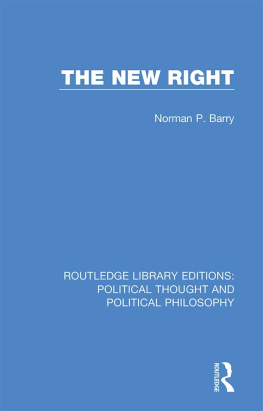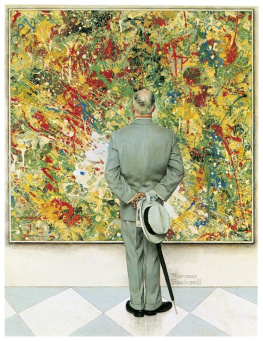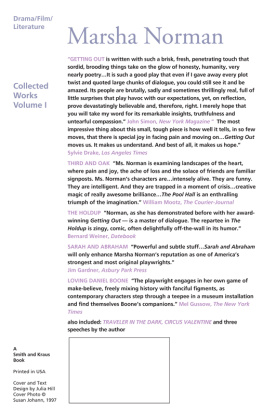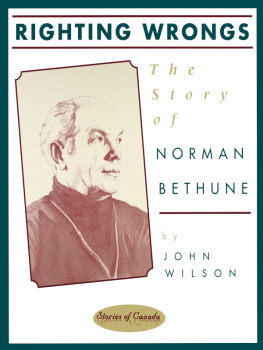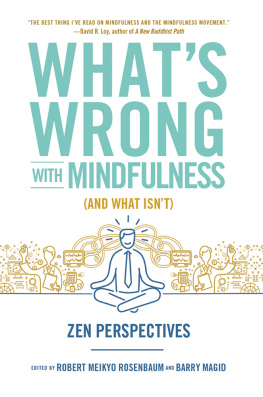ROUTLEDGE LIBRARY EDITIONS:
POLITICAL THOUGHT AND POLITICAL PHILOSOPHY
Volume 3
THE NEW RIGHT
THE NEW RIGHT
NORMAN P. BARRY
First published in 1987 by Croom Helm Ltd
This edition first published in 2020
by Routledge
2 Park Square, Milton Park, Abingdon, Oxon OX14 4RN
and by Routledge
52 Vanderbilt Avenue, New York, NY 10017
Routledge is an imprint of the Taylor & Francis Group, an informa business
1987 Norman P. Barry
All rights reserved. No part of this book may be reprinted or reproduced or utilised in any form or by any electronic, mechanical, or other means, now known or hereafter invented, including photocopying and recording, or in any information storage or retrieval system, without permission in writing from the publishers.
Trademark notice: Product or corporate names may be trademarks or registered trademarks, and are used only for identification and explanation without intent to infringe.
British Library Cataloguing in Publication Data
A catalogue record for this book is available from the British Library
ISBN: 978-0-367-21961-1 (Set)
ISBN: 978-0-429-35434-2 (Set) (ebk)
ISBN: 978-0-367-23048-7 (Volume 3) (hbk)
ISBN: 978-0-429-27814-3 (Volume 3) (ebk)
Publishers Note
The publisher has gone to great lengths to ensure the quality of this reprint but points out that some imperfections in the original copies may be apparent.
Disclaimer
The publisher has made every effort to trace copyright holders and would welcome correspondence from those they have been unable to trace.
THE NEW RIGHT
NORMAN P. BARRY
1987 Norman P. Barry
Croom Helm Ltd, Provident House,
Burrell Row, Beckenham, Kent BR3 1AT
Croom Helm Australia, 4450 Waterloo Road,
North Ryde, 2113, New South Wales
British Library Cataloguing in Publication Data
Barry, Norman P.
The new right.
1. Conservatism 2. Liberalism
I. Title
320.52 JC571
ISBN 0-7099-1833-X
Published in the USA by
Croom Helm
in association with Methuen, Inc.
29 West 35th Street,
New York, NY 10001
Library of Congress Cataloging-in-Publication Data
Barry, Norman P.
The new right.
Includes index.
1. Liberalism. 2. Libertarianism. 3. Laissez-faire.
4. Conservatism. I. Title.
JC571.B364 1987 320.51 87-9056
ISBN 0-7099-1833-X
Printed and bound in Great Britain
by Billing & Sons Limited, Worcester.
Contents
In recent years there has been much talk of the break-up of the consensus, both in current social and political thought and in political practice, and the emergence of something called new Right social philosophy. The terms consensus, Right and Left have, perhaps, little exact descriptive meaning in political discourse, but they are nevertheless used repeatedly, if only for want of better terms. Some clarification is therefore essential.
The consensus, which is explained fully in chapter one, simply refers to the body of social and economic ideas that ruled political thought and practice in most Western democracies from the end of the Second World War to about the mid-1970s. Of course, there was a great variety of policy positions covered by the term consensus, but there was sufficient common ground for it to function as a target for attack from heterodox political opinion. Consensus refers to a kind of agreement (genuine or otherwise) about ends and values: in this case the ends and values were economic growth, low inflation, a wide participation in politics, a more extensive social and economic equality, and the full range of civil liberties. These principles perhaps sound innocuous but what was distinctive about the architects of the consensus was the belief that the only means to bring about those ends were political and state actions. What was significant about the post-war years was not just the periods of high inflation, nationalisation and rapid extension of the welfare state but the common root from which all these phenomena stem the pre-eminence of politics as a decision-making method for social problems. No doubt, this was democratic politics, or at least non-authoritarian politics, but it nonetheless evinced a firm rejection of market processes, or traditional rule-following, as solutions to economic and social problems. The public world of politics and administration gradually but perceptibly replaced the private world of individual choice and voluntary action as the focus of attention for political thought and practice.
The kind of new Right thinking that is described in this book is primarily the intellectual response to the consensus and the mode or style of politics associated with it. I attach little significance to the word Right; I use it for no other reason than the fact that the political thought I discuss is commonly called right-wing. However, I would stress at the outset that this book is not at all concerned with that old-style, neo-collectivist and anti-liberal Right associated with some types of European conservatism. Often this is monarchical and religious and has little or no connection with the intellectual issues analysed in the following pages.
My concern is mainly with the classical liberal or individualist response to the break-up of the consensus and, to a lesser extent, with a certain type of conservatism. I maintain that in traditional English political thought, at least, classical liberals and conservatives have a lot more in common than the leading spokesmen of either tendency are prepared to admit. This similarity is not explained merely by the fact that it is Conservative political parties that have adopted, to some extent, free-market policies in recent years; it is more to do with a particular conservative tradition a tradition which, as I try to show, was all but obliterated by post-war consensus conservatism.
My main concern in this book is with political thought rather than political philosophy. I have written elsewhere on some of the more abstract and theoretical questions of classical liberalism and individualism. Thus I am concerned with those aspects of classical liberal political and economic ideas that have had a bearing on public policy and institutional reform in the past decade, especially in Britain and the USA. Although this is neither a work on public policy nor contemporary history, I have found it useful in some areas to look at those policy problems on which liberal ideas have had a direct or, more likely, indirect, influence. This has meant that I concentrate almost entirely on the utilitarian aspects of liberalism, with only fleeting reference to the natural rights or purely ethical bases of individualist thought.
A word of clarification on my use of the term liberal may be appropriate. Most of the time I use it in its traditional sense in reference to free-market and individualist ideas in economic matters. In political matters liberalism describes key aspects of constitutionalism and the rule of law. The problem is that today, liberalism is rarely used exclusively in those ways and has come to be associated (erroneously) with many aspects of consensus-based social thought. This is especially true of America, where liberalism is used in almost the opposite sense to that intended by the founders of the doctrine. I hope that it is clear to the reader which senses of this difficult term is being used in the text.



